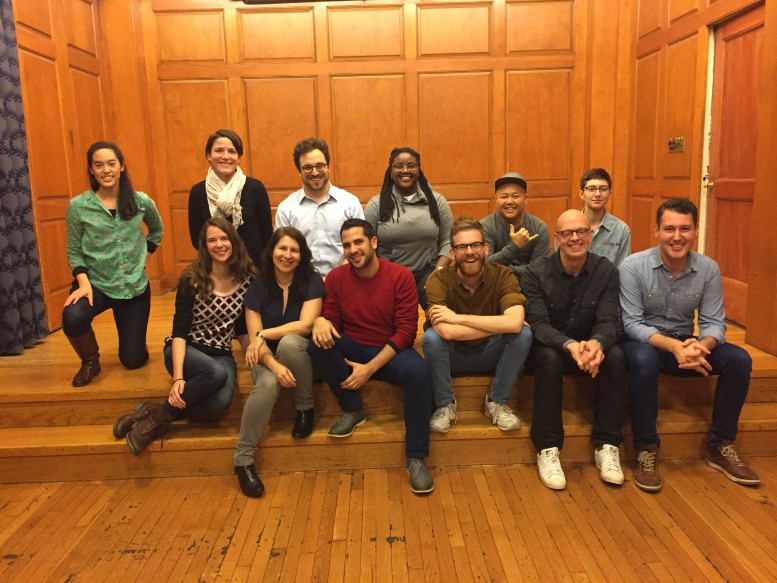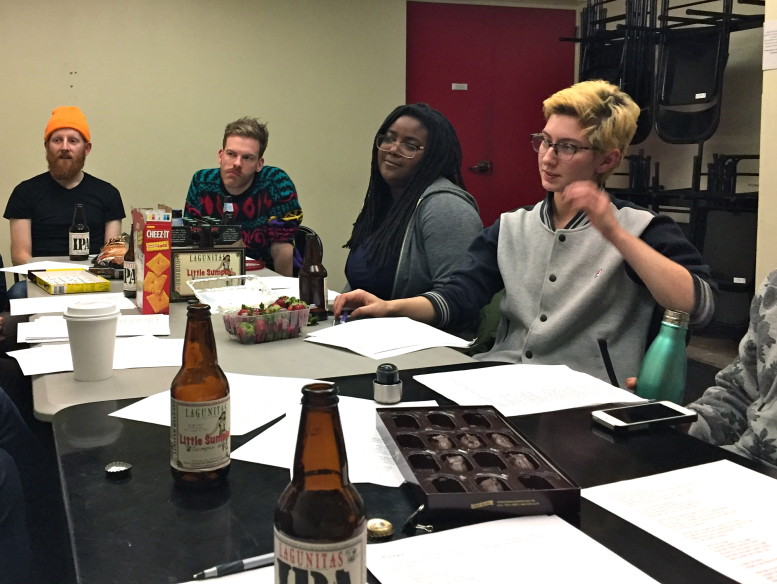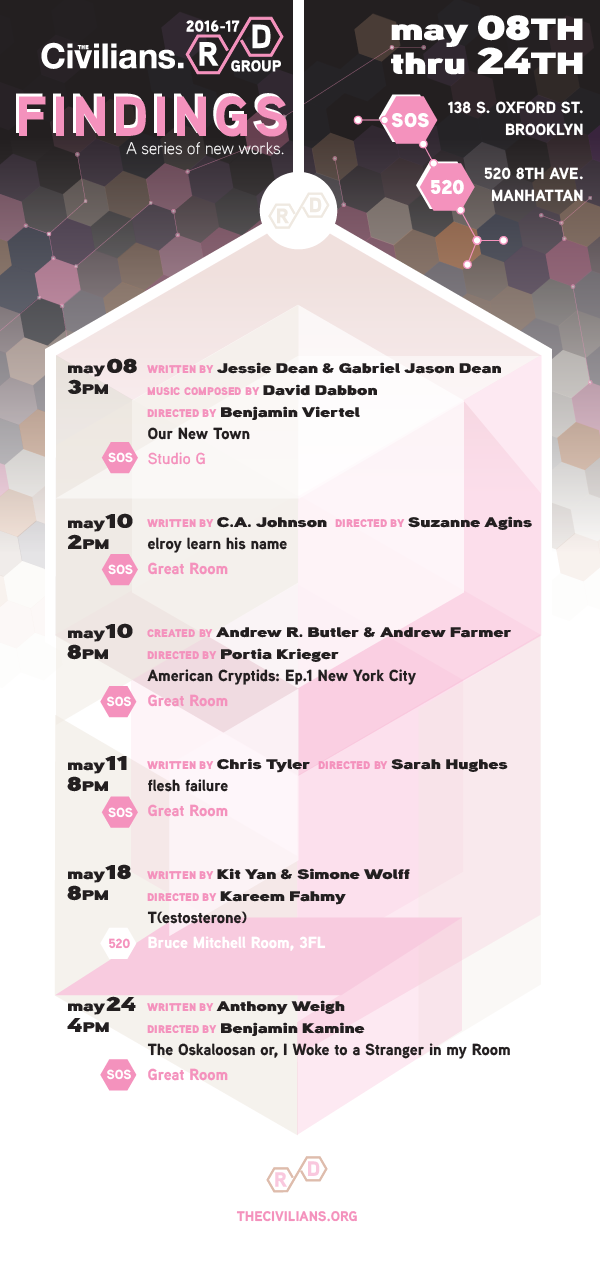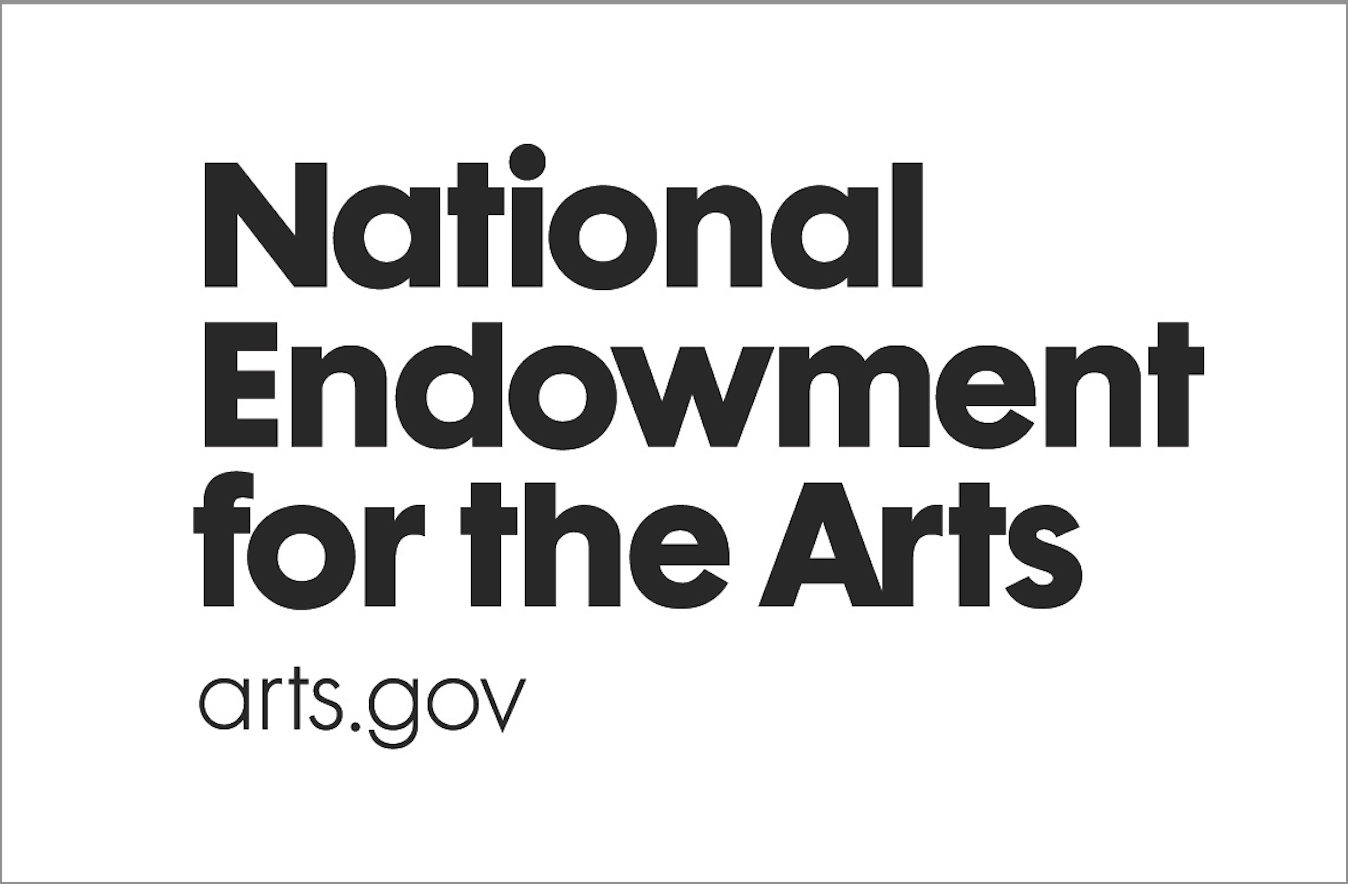If you are a project creator or director, applications for next season’s group are open and due June 15, 2017.
Each year the Civilians gathers together a community of writers, composers, directors, and other generative artists to embark on their own investigative theatre adventures as part of the R&D Group. Projects often come to us in their initial stages and by the end of the nine month residency, members share their works-in-progress as part of the FINDINGS Series. I deeply admire the great artistic courage and creative fortitude it takes to enter into this kind of work. It can be a terrifying, yet fruitful time to test out ideas, follow artistic impulses, throw out what isn’t working, and share strategies with other members. This year, the projects have utilized different investigative methods, including journeys through personal histories, research into pressing current events, trips to the gun range, as well as interviews with folks who believe Bigfoot is real. Though the projects are unique and distinct, common themes have emerged, including the search for truth amid fact and fiction and storytelling as a site for reclaiming and resistance.

Members of the 2016-17 Civilians R&D Group. Photo Credit: Felicia Limada.
Our series begins with “Our New Town,” written by Jessie Dean and Gabriel Jason Dean with music by David Dabbon and direction by Benjamin Viertel. The play is set on a college campus that recently endured a deadly shooting during a theatre production of Thornton Wilder’s “Our Town.” The surviving members of the cast decide to create their own performative space in which to grieve, heal, and ask difficult questions of each other and society. The piece was inspired in part by a recent campus carry law passed in Texas that allows college students over the age of 21 holding concealed handgun licenses to carry guns into public university buildings and classrooms. Without shying away from the many points of view surrounding guns and gun ownership, the creative team examines the role art can play in response to violence and tragedy.
Also inspired by recent headlines, “elroy learn his name,” by C.A. Johnson with direction by Suzanne Agins, takes a hard look at America’s prison industrial complex and a 17-year-old boy named Elroy who is irrevocably changed after being abused within the system. Elroy’s mother, Maggie, calls upon a journalist from the New York Times, Elizabeth, to expose what happened to her son. When Elroy’s story takes a devastating turn, all involved are caught in the aftershocks. With poetic imagery and fearless realism, Johnson investigates the ethics of ownership surrounding painful personal narratives and explores what justice can be attained in the telling and retelling of these stories.
The third presentation in the series, “American Cryptids: Ep.1 New York,” created by Andrew R. Butler and Andrew Farmer and directed by Portia Krieger, examines cryptozoological creatures, such as Bigfoot, the Jersey Devil, and the Moth Man. Utilizing interviews with individuals who have encountered these beings and the musical stylings of a host of guest performers, Butler and Farmer guide us through the weird and wonderful world of cryptozoology. More than a simple exploration into the “do they or don’t they exist” question, the creative team is offering a nuanced discussion about the very nature of belief. How do these regionally specific cryptids offer a space where local communities of believers can find real connection in pursuit of the seemingly unreal? In this theatrical world where Bigfoot and the Moth Man take turns at the mic, cryptids function as catalysts for conversations about life’s larger mysteries.

Andrew R. Butler, Chris Tyler. C.A. Johnson and Simone Wolff at a Civilians R&D Group meeting. Photo Credit: Megan McClain.
Our fourth presentation, “flesh failure,” by Chris Tyler with direction by Sarah Hughes, explores radical performance traditions of the late 1960s, from The Living Theatre to “Hair” and beyond. Tyler turns an investigative eye toward the intersections of countercultural resistance and sexual liberation and how they might offer useful ritual modes for navigating our contemporary political climate. Utilizing a collage-based, research-oriented, and experimental composition process, Tyler hopes to find out, “what might happen politically if (and when) we fuck more freely?”
Looking at the history of testosterone use from an intergenerational point of view, Kit Yan and Simone Wolff’s “T(estosterone)” is a thoughtful investigation into trans lives and the multifaceted and varied lived experiences of those using (or choosing not to use) T. The project, directed by Kareem Fahmy, follows trans friends Lee and Blue on a trip to Planned Parenthood. The creative team sought to craft a piece that would actively resist oversimplified narratives that surround testosterone as hormone replacement therapy. Mixing text from interviews and their own original poetry, Yan and Wolff delicately weave together a compelling story about the complexities surrounding T, identity, gender, love, and friendship.
Finally, we will round out the series with “The Oskaloosan or, I Woke to a Stranger in My Room,” by Anthony Weigh with direction by Benjamin Kamine. The play takes its inspiration from a real social experiment in which an 8-year-old Oskaloosan boy was observed and his every move recorded for an entire day in 1949. The story follows the efforts of a writer who attempts to track down those affected by the study 68 years later. In his quest for deeper meaning, the writer finds that facts can only offer part of the story. Sometimes the truth is stranger than fiction…except for when it’s not. Drawing upon interviews, correspondences, field research in Oskaloosa, and invented flights of fantasy, Weigh deliciously blurs the boundaries of past and present, fact and fiction, truth and imagination.
After many months of research and development, we’re excited to share these FINDINGS May 8-24. To RSVP please email civiliansrsvp@gmail.com and indicate which presentation you’d like to attend and how many tickets are desired.

Post Views:
696





